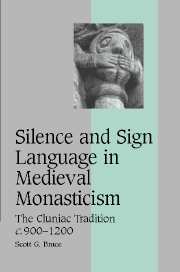Book contents
- Frontmatter
- Contents
- List of tables
- Acknowledgments
- List of abbreviations
- Map
- INTRODUCTION: THE DORMANT LANGUAGE
- 1 UTTERING NO HUMAN SOUND
- 2 THE TRAINING OF THE HAND
- 3 A SILENT COMMERCE OF SIGNS
- 4 TRANSMISSION AND ADAPTATION
- 5 CONTINUITY AND CRITICISM
- CONCLUSION
- Appendix A: The Cluniac sign lexicon
- Bibliography
- Index
- Cambridge Studies in Medieval Life and Thought Fourth Series
INTRODUCTION: THE DORMANT LANGUAGE
Published online by Cambridge University Press: 16 July 2009
- Frontmatter
- Contents
- List of tables
- Acknowledgments
- List of abbreviations
- Map
- INTRODUCTION: THE DORMANT LANGUAGE
- 1 UTTERING NO HUMAN SOUND
- 2 THE TRAINING OF THE HAND
- 3 A SILENT COMMERCE OF SIGNS
- 4 TRANSMISSION AND ADAPTATION
- 5 CONTINUITY AND CRITICISM
- CONCLUSION
- Appendix A: The Cluniac sign lexicon
- Bibliography
- Index
- Cambridge Studies in Medieval Life and Thought Fourth Series
Summary
“Every angel is terrifying.” The sentiment of this line from Rainer Maria Rilke's poem The First Elegy (1912) seems as cold and distant as starlight. It contrasts markedly with the sympathetic and comforting images that late modern people usually evoke when they think about the messengers of God. Over the past century, one of the most understated achievements of western culture has been the successful domestication of these immortal beings of light. While Rilke could still imagine that any contact with angels would consume him in their “overwhelming existence” (stärkeres Dasein), the notion that their beauty is the beginning of terror has lost its meaning in the cultural vocabulary of the west. With softened gazes, these celestial beings now accompany us through the paces of our mundane lives, sigh along with us at our troubles, and offer up to us as comfort a longer, more balanced, perspective on the anxieties that attend our mortal condition. Even the most sublime articulations of this image, like Wim Wenders' celebrated film Der Himmel über Berlin (1986), subvert Rilke's hierarchy in ways that ensnare angels in our own narcissistic preoccupations.
Despite the gulf of centuries that separate them, Rilke's depiction of angels as remote and untamable agents of God that inspired sincere awe and fear in those mortals fortunate (or unfortunate) enough to encounter them had much in common with the sensibilities of the early medieval monks who are the subject of this book.
Information
- Type
- Chapter
- Information
- Silence and Sign Language in Medieval MonasticismThe Cluniac Tradition, c.900–1200, pp. 1 - 12Publisher: Cambridge University PressPrint publication year: 2007
